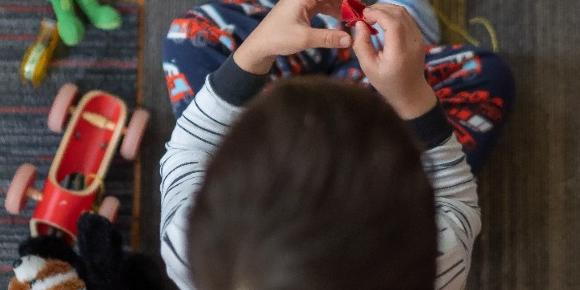
As adults, we can easily blame our short attention spans on social media and YouTube. But our kids are a little bit different–they haven’t been corrupted by the internet yet! In general, young children have a limited amount of time they can pay attention to anything–sometimes it’s long, and sometimes it’s short. But there are times when a short attention span in children might be a sign of something more serious.
This can be very difficult for a parent to diagnose on their own. Sometimes kids just don’t feel like paying attention to something! A doctor will be able to help you determine when a short attention span in children is a normal phase or a sign of an underlying issue.
What is an Attention Span?
The very simple definition of an attention span is the length of time you can pay attention to any one thing without losing interest. In both adults and children, attention spans will vary wildly depending on a lengthy list of factors. For example, your child may have a robust attention span when coloring–but a very short one when taking a bath. As your kids grow up, they may have lengthy attention spans when playing video games, but short attention spans at school.
So, what’s a “normal” attention span in children? Well, toddlers have a typical attention span of around 8-12 minutes. By the time kids are age 10, this number goes up to 20-30 minutes. But there are so many factors that could impact this:
Innate interest in a topic or activity. (Does your child love dinosaurs? That dinosaur documentary may hold their attention for much longer than 30 minutes.)
General mood. Is your child hungry? Or irritable? This will significantly impact attention span.
Cognitive abilities: In some cases, certain tasks may be too challenging for the developmental level of your child–this frustration can cause attention spans to shrink.
Other distractions: If there are other shiny objects your child would rather be spending time with, attention spans will be shorter.
With so many variables attached to normal attention spans, how do you know when your child’s drifting concentration might be something else?
Signs of a Short Attention Span in Children
Everyone has good days and bad days. When you look for a short attention span in kids, it’s important to evaluate them on their good days. (Or, at least, on their average days.) Your pediatrician will have special diagnostic tests and protocols that can help them determine whether your child’s attention span is abnormally short or erratic.
There are also some signs that parents can watch out for:
Your child leaves tasks half-finished or undone. (This is somewhat normal for younger children, so this one depends on age.)
Trouble paying attention to conversations.
A seeming inability to listen. It may feel like your child is not paying attention to anything you say.
Your child easily pays attention to (or seems to hyperfocus on) one thing but has an inability to focus on other tasks.
Your child seems forgetful (or more forgetful than usual).
An inability to sit still: it feels like your child always has to be moving or doing something with their hands.
Your child doesn’t make eye contact.
What Causes Short Attention Spans in Kids?
Your child’s short attention span is likely just a symptom–not a cause in and of itself. There are several things that could be causing a short attention span in your child. Some of the most common are:
ADHD: Also known as Attention Deficit Hyperactivity Disorder, we know a lot more about this condition than we did twenty years ago. And the symptoms are not always what you think they might be. (For example, hyperfocus is one of the more recently recognized symptoms of ADHD).
Depression and Anxiety: If your child has trouble paying attention, it may be due to depression or anxiety. There was a time when children were thought to be too young for these conditions, but that assessment has changed. Your child can be screened for mental health concerns.
Learning disabilities: For school age children, learning disabilities can often present as a short attention span. Sometimes the root cause is dyslexia or dysgraphia, for example. Your pediatrician will be able to help diagnose learning disabilities and provide referrals to specialists who can help. Addressing the learning disorder can improve the attention span.
Obsessive compulsive disorder: Sometimes known as OCD, this condition can often manifest as a short attention span in children–largely because children with OCD are distracted. They have obsessive thoughts. As a result, they are also thinking about the rituals they must perform to keep bad things from happening. This can lead to significant distraction–and that can appear like an attention deficit.
Trauma: Children deal and cope with trauma in a wide variety of ways. Some of those presentations may understandably cause a shorter attention span.
There are many instances in which a short attention span in your child is just regular and typical boredom. But there are some cases in which your child’s short attention span may be indicative of something a bit more serious. And attention disorders can have lasting repercussions on your child’s academic performance. But many of the underlying conditions are very treatable, and attention spans can dramatically improve with the right therapy.
Your pediatrician can help you evaluate your child for attention span issues. Contact Children’s Healthcare Associates today to schedule an appointment and get your attention span questions answered.
